When caring for your dog, it’s just as important to understand which foods are harmful to them as much as it is knowing which foods they should be eating. In this infographic we advise you on which human foods are unsafe for your pet pooch to consume so you can provide them with a balanced, healthy diet. Read these 10 examples of foods harmful to dogs and their healthy alternatives so you can keep your furry friend both happy and healthy.
Share this Image On Your Site
10 Foods Harmful to Dogs
Chocolate
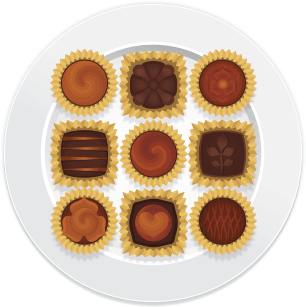 Why it’s harmful
Why it’s harmful
Despite being a favoured food choice amongst humans, chocolate contains a highly toxic substance called methylxanthines theobromine which can prove fatal for dogs. These stimulants can stop your dog’s metabolic process, speed up their heart rate and affect their nervous system.
What it causes
Even a small amount of chocolate can cause your dog to suffer from diarrhea, dehydration and vomiting. However, a large amount of chocolate can cause seizures, irregular heart rhythm, muscle tremors, and even death.
Healthy alternative
Carob powder is a brilliant chocolate substitute for dogs, as it has a sweet, earthy flavour without containing any of the harmful chemicals, making it the perfect sweet treat for your pet pooch.
Onion
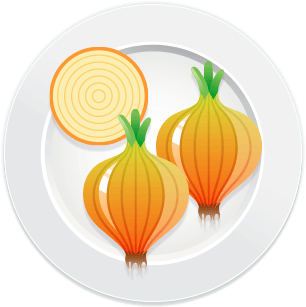 Why it’s harmful
Why it’s harmful
Onions contain an ingredient called thiosulphate which is toxic to dogs when consumed. As such, feeding your dog onions can damage their red blood cells and cause them to become very ill.
What it causes
The most common side effects of onion ingestion include allergic reaction, anemia, vomiting, liver damage, asthma attacks, and diarrhea.
Healthy alternative
If you want to ensure that vegetables are a staple food in your dog’s diet, you could feed them a handful of green beans or raw/steamed/cooked stems of broccoli.
Garlic
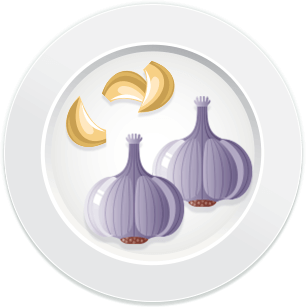 Why it’s harmful
Why it’s harmful
In terms of toxicity, garlic is far stronger than onion due to the compounds it contains, meaning that even the smallest amount of garlic will most likely poison your dog.
What it causes
Anemia is one of the main illnesses associated with garlic consumption which can cause your dog to experience a fast heart rate, become lethargic and even collapse.
Healthy alternative
Similar to onions, if you want to include vegetables in your dog’s diet, you can add some carrots to their bowl.
Ice cream
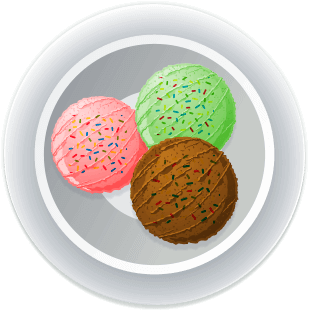 Why it’s harmful
Why it’s harmful
Whilst it may seem tempting to share your ice cream with your dog on a hot summer’s day to cool them down, in actual fact this can cause them great discomfort as they cannot digest dairy properly.
What it causes
The high sugar content of ice cream can lead to obesity, dental issues and diabetes. Their inability to digest dairy properly also means that they may experience gastric problems, such as diarrhea.
Healthy alternative
If your pet is lactose intolerant, your best bet is to avoid dairy altogether. As such, try frozen chunks of fruit – such as strawberries, raspberries and apples – to give your pet pooch an icy, tasty treat!
Milk
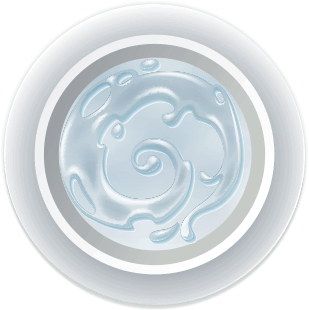 Why it’s harmful
Why it’s harmful
Lactose intolerance affects many breeds of dog, and whilst consumption of milk is not life-threatening, it can cause bacterial exposure which can eventually lead to serious diseases.
What it causes
Ingestion of milk can lead to significant health issues, such as acute intestinal distress e.g. vomiting, diarrhea and gastrointestinal problems.
Healthy alternative
If your dog is lactose intolerant, the safest substitute for milk would be fresh water. Drinking water is the best way for your pet pooch to stay fully hydrated and receive the necessary nutrients, whilst avoiding anything which may harm them.
Macadamia nuts
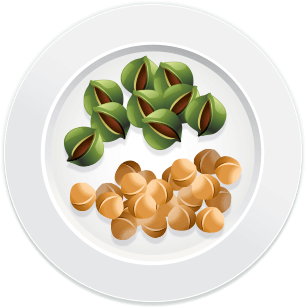 Why it’s harmful
Why it’s harmful
Macadamia nuts are considered one of the most poisonous foods for dogs, with symptoms appearing within 12 hours of ingestion and lasting between 12 to 48 hours.
What it causes
Ingestion of macadamia nuts can cause vomiting, high temperature, lethargy, tremors and hyperthermia when fed to dogs, and can even affect the nervous system.
Healthy alternative
In moderation, peanuts (raw or roasted, removed from their shells and unsalted) cashews (cooked or roasted) and hazelnuts can be safe alternatives to macadamia nuts for dogs.
Please note: hazelnuts can pose a choking hazard for small dogs.
Almonds
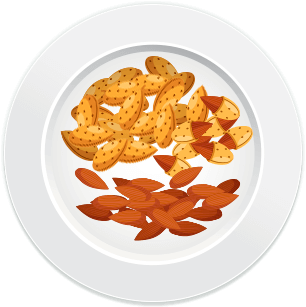 Why it’s harmful
Why it’s harmful
Although almonds are not as toxic as macadamia nuts, they can become lodged in a dog’s throat or tear their windpipe if not chewed properly.
What it causes
Salted almonds can increase water retention which can prove fatal for dogs who are prone to heart disease, including breeds such as Cavalier King Charles Spaniels, Labrador Retrievers and Great Danes.
Healthy alternative
Similar to macadamia nuts, if you are looking to feed your dogs nuts, make sure you substitute almonds with peanuts, cashews or hazelnuts.
Avocados
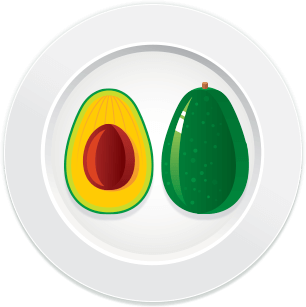 Why it’s harmful
Why it’s harmful
Avocados contain a toxin called Persin in their leaves, pits, bark and fruit which can have varying effects on your dog’s health.
What it causes
A dog’s inability to digest plant-based foods properly means that eating an avocado can cause stomach issues such as diarrhea and vomiting. The pit of the avocado can pose a choking hazard for your dog, and is the main part of the avocado where Persin can be found.
Healthy alternative
If you are in need of a vegetable substitute for avocado which is a great source of fibre, pumpkin is the solution. Served raw or from a can, pumpkin can aid with digestive issues.
Grapes
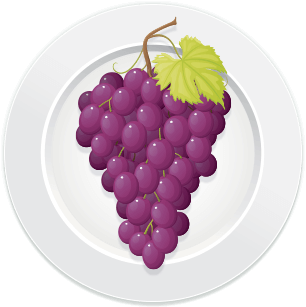 Why it’s harmful
Why it’s harmful
It is not yet known what makes grapes toxic for dogs to consume, but what is obvious is how ill it can make them.
What it causes
Not only can grapes cause dogs to experience vomiting, diarrhea and lethargy, but in more serious cases they may fall victim to kidney failure. Symptoms will be dehydration and lack of appetite, although this may not show up in all types of dogs.
Healthy alternative
Apples are a great alternative to grapes, as they are full of vitamins and nutrients, and are a good source of fibre. When feeding an apple to your dog, make sure you leave the skin on and remove the core as this can be a choking risk.
Bacon
 Why it’s harmful
Why it’s harmful
It’s no secret that bacon has a high fat content, and this can lead to pancreatitis in dogs.
What it causes
Pancreatitis will cause your dog’s pancreas to become inflamed and fail to function properly. Not only that, bacon consumption can lead to major digestion and nutrient problems.
Healthy alternative
For a healthy substitute to bacon, why not try feeding your dog some cooked salmon? High in omega-3 fatty acids, cooked salmon can support your dog’s immune system and aid a shinier coat.
Important Note
If your dog has consumed any of the harmful foods listed above, it’s imperative that you call a veterinary professional immediately.
How we can help
With a wealth of experience in the animal care industry, here at Green Lane Farm we provide safe, secure and clean cattery and kennel facilities for cats and dogs throughout Chessington, Kingston and the wider areas of Surrey. We provide an extensive a la carte menu to cater to your pet’s dietary needs, and have excellent contacts with local vets should your pet fall ill whilst with us.
For further information about which foods are harmful to dogs, or to find out more about any of our services, simply contact our friendly team today.





